6 Ways to Invite Love to a Death Anniversary
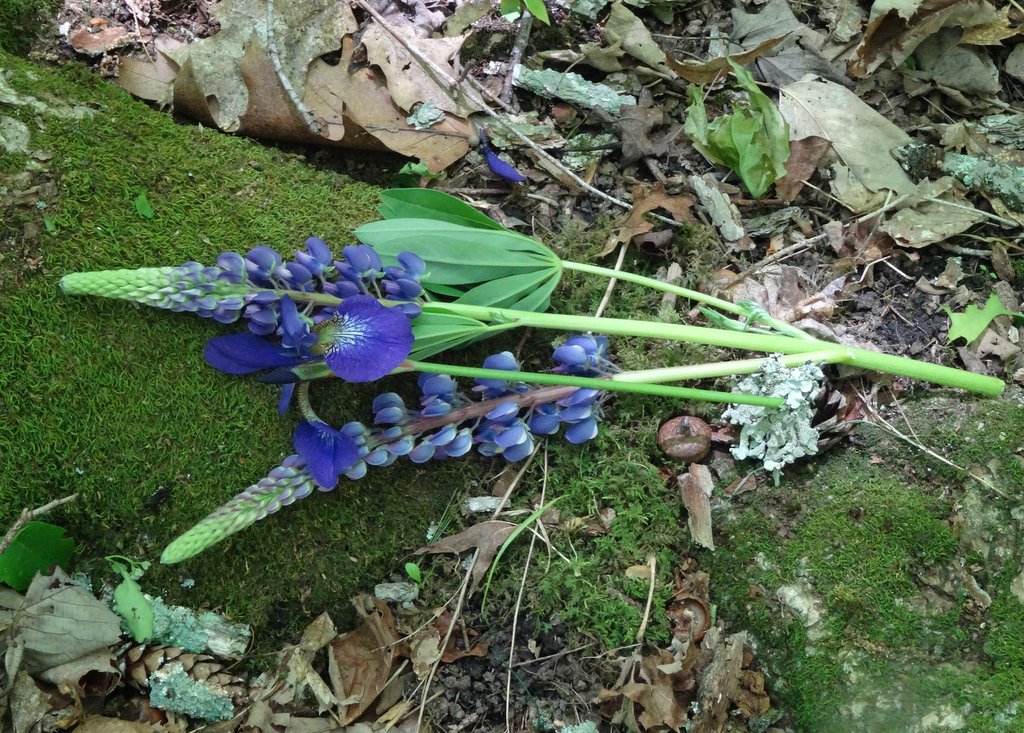
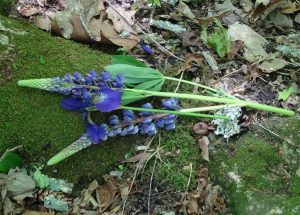 “Your task is not to seek for love,
“Your task is not to seek for love,
but merely to seek and find all the barriers within
yourself that have been built against it.” ~Rumi
On June 3, I’ll create a ritual of remembrance for my husband Vic who died in 2008. It’s something I do every year.
“Aren’t you done with that by now?” you might ask. It’s a question I ask myself.
I’ll be done when I stop thinking of Vic when I see Swallowtails dining on Dame’s Rockets in early June. I’ll be done when the fields are no longer covered with purple-blue Lupine blossoms as they were on the day he died. I’ll be done when the bluebirds stop tending their nestlings in early June.
I’m not doubled over with grief anymore, but I don’t forget.
Instead of distracting myself or avoiding my sadness, I make a simple plan. I’ll print a poem and song lyrics and call the dogs to join me as I walk to the forest. Six things help me feel surrounded by love. You may think of more.
1. Choose a meaningful site.
You may have a gravesite to visit or an altar in your home or a place you enjoyed with the person you miss. My sons and I built a cairn for Vic in the forest in 2008. That’s my place. This woodland sanctuary was sacred to my family long before Vic’s death, and it’s more sacred now.
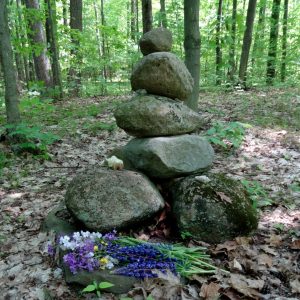 2. Offer flowers or light a candle.
2. Offer flowers or light a candle.
On the way to the cairn, I’ll pick Lupines, Dame’s Rockets, and Buttercups in the field. Near Vic’s cairn, I’ll pray for the well-being of my family at the “family trees,” a cluster of basswood giants that sprang from a central mother tree. I’ll leave some of my flowers there.
Then I’ll turn to Vic’s cairn, brush leaf debris from the flat stone, and place flowers on the rocky altar. I’ll sit on a large round stone near the cairn to breathe and feel the silence.
3. Include meaningful music.
When my mind is quiet and despite my hearing loss, I’ll sing a familiar song I heard in a dream soon after Vic died. The dream song gave me hope and faith at the hardest time. It still does.
When I find myself in times of trouble,
Mother Mary Comes to Me,
Speaking Words of Wisdom
Let it be…
The lines, “In my hour of darkness, She is standing right in front of me,” will make me cry. They always do.
I’ll tell Vic (or the Vic in me) how much I love him and how persistent my longing is. I’ll tell him I’m OK without him, but miss him every day. Then, I’ll read this poem.
Your body is away from me
but there is a window open
from my heart to yours.
From this window, like the moon
I keep sending news secretly.
~Rumi
Perched on the stone near Vic’s cairn with dogs bumping into me, I’ll tell Vic the family news. I have a new pup who is great friends with my old dog Willow. I imagine Vic’s eyes sparkling with tears as I tell him about bringing Disco home from the SPCA and what a great companion she has become for Willow and me.
I’ll tell him about this pandemic year and my struggles with hearing loss and living in a world of electronic sound. I’ll tell him our son David came from North Carolina to celebrate Mother’s Day and our other son Anthony bought a home and land just three miles from me. I’ll tell him we have much to be thankful for.

6. Let grief out to make space for love.
When I don’t defend my heart against the pain of grief, love pours in. When I unbandage the wound and tend it, compassion for myself and others who grieve pours in. I don’t say, “Grief, you’ve been around too long. You should be gone by now.” I don’t resist. I don’t pretend my heart didn’t hurt. Instead, I let it be. I let myself be.
Tears dampen my shirt, but instead of drowning in grief, I float in love.
***
I first wrote this piece in 2017, but I edited to bring it up to date. A lot has happened for all of us, for the whole world, in the last four years. Have you created a personal ritual to honor someone you love on a difficult anniversary day such as a birthday or a death day? Was it helpful or meaningful? For other posts about rituals, see Creating a Grief Ritual. I love using poems in my blogs and in rituals. The poems in Poems to Grieve By helped me most at the hardest times. Since it has over 26,000 readers, it must be helping others, too.



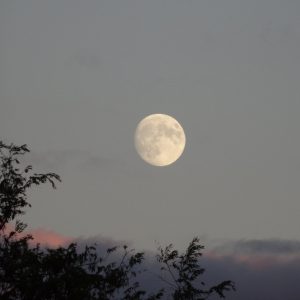

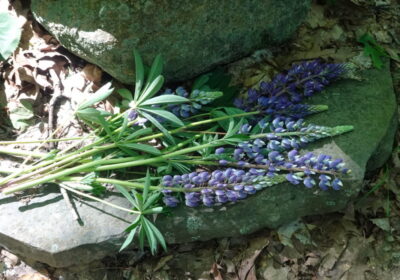
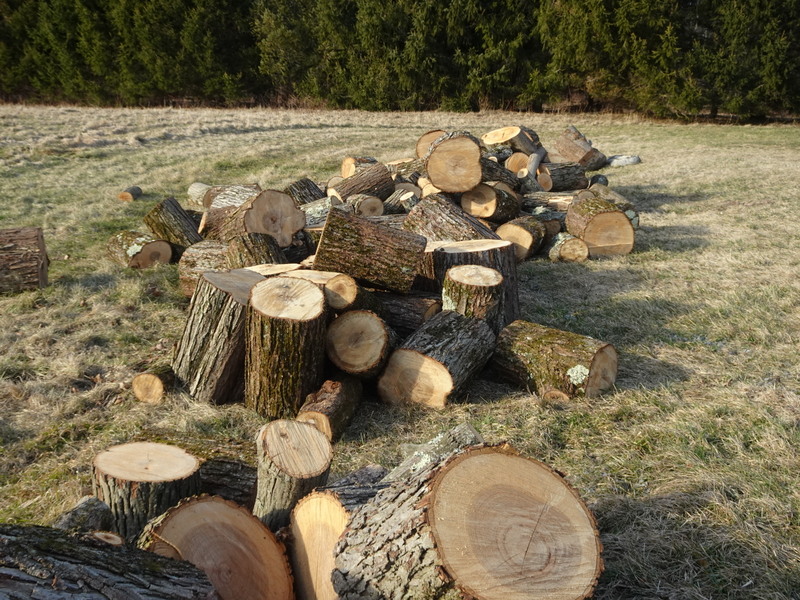
May 27, 2020 at 6:13 pm
Randy
Weeks before the anniversary of my daughter passing away,I automatically
Go into a somber,gloomy depressed state of mind.i dont even have to be thinking about her.it just comes.after 25 years,its still
hard to visit her grave.it took me 25 years
To even open up and address my grief that I
had suppressed and ignored.when I finally did,
I felt a rush of relief.but as time goes by i find myself regressing back to ignoring it all
Again.it would be hard to celebrate.
May 28, 2020 at 9:59 am
Elaine Mansfield
Dear Randy,
I can’t imagine the grief of losing a child. I’m so sorry, no matter when it happened. I know from losses in my family that the grief doesn’t go away even if it softens. I believe grief should stay with us as a teacher to keep our heart open to love and to others who suffer and to remind us of our own mortality. Because I invite reminders and love writing stories about life with my husband, grief doesn’t go underground and blindside me. I would say about your somber mood: “That’s the way your Love feels now.” I feel relief in honoring that mood, in visiting my husband’s gravesite and leaving flowers there and remembering times together. It’s sad, but it lets my feelings flow and then I can go on in a lighter mood.
This may not be your way. For me, it rarely feels like a celebration but more like a recognition of longing for what can’t be. A universal human experience of grief. Everyone has to handle loss in a way that works for them. I walked to my husband’s cairn (burial site) every day for years because it made me feel less bottled up with sadness, but I don’t go often now–usually. In this time of staying home and spending so much time alone, I find my longing for him stronger than it was and I let that be. Of course, I’d rather be quarantined with him. I keep his photo up and have an altar. His death was hard and painful, but his life and love were a gift and my sense of connection to him is strong. He still appears in my dreams and I still talk about him with people who knew him. This is my way. I hope you find what works for you and can keep that love alive and your heart open. I wish I had more to offer you, but I honor your grief.
July 22, 2017 at 12:20 am
Kristina
Elaine, how does the grief make room for love? How did you start to heal? I lost my daughter suddenly almost 6 months ago, and I feel like I may be the way you described your mother as dealing with your father’s death. I have 2 more children at home, and I feel like a zombie a lot of the time. I can’t accept the feelings and cry (all the time). I need to put on some facade of normalcy. I am struggling, can you offer some advice?
I listened to someone say people die everyday and your not necessarily grieving death, it’s the hole that is left in your life. How do I fill that hole with love?
July 22, 2017 at 9:52 am
Elaine Mansfield
Oh Kristina. I’m sorry about your daughter’s death and the suffering you are forced to carry. Of course you have to keep some facade of normalcy for the sake of your other children–and for yourself. I’m not a counselor, but can speak as a friend. Remember that, in writing about inviting love to a death anniversary, I have time on my side. It’s been nine years since my husband died. I couldn’t have said what I’m saying now just six months after his death. The wounds were raw then and the sense of absence. Somehow, day after day, I learned to carry the grief. And the pattern was cyclic, so sometimes lighter and sometimes a plunge into another round of grief. Here’s a great article about that rhythm: https://tricycle.org/trikedaily/grief-series-contractions-expansions/ You’re in what Dr. Joanne Cacciatore calls contraction.
Do you have people you can talk to about your deepest feelings in a regular way? I got so much help from a therapist where I could let down my guard and let the feelings flow. Not a friend or my kids, but a therapeutic hour or two set apart just for me. In my area, our Hospice offers free bereavement counseling for the first 13 months and free bereavement groups no matter how long it’s been since the death. None of this depends on your daughter having been a hospice patient, but each hospice is different. Peer groups are incredibly helpful. There’s one just for parents called “The Compassionate Friends.” It’s active in many places, so there may be a chapter near you–or you can be in touch with them on line. Here’s a link: https://www.compassionatefriends.org
Back to your basic question. I had to give time to grief every day. I lived alone and that made it easier (and more lonely), but perhaps time after your kids have gone to bed or before they get up. It can be short or long, depending on what’s available, but it should be yours. Maybe writing the hard and loving stories and memories of your daughter’s death, or lighting a candle for her and for you, or prayer, or meditation, or other modes of remembrance that work for you. Anything to let the grief have a seat at the table. I found daily small personal rituals helpful, and these can include your other children. I’m sure they’re very sad, too. For ideas about personal ritual, you might want to look at my TEDx talk “Good Grief! What I Learned from Loss.” https://www.youtube.com/watch?v=PBzEwf1k59Y My sons and I give space to remembering my husband when we’re together. There are usually tears and then stories. It helps us remember our love for him and each other.
There are no ways to get through grief easily. I simply found that if I allowed myself to open to the pain (support can help with this in the beginning), love came pouring in. I still longed for and missed him, but sorrow felt like another, harder kind of love. Many people say that grief is the last chapter of love. I agree with that. In the beginning, I felt overwhelmed by the emptiness and absence, but with help and in time, I knew my tears and my sorrow were fueled by a love that would never die. If I didn’t give grief a place in my conscious life, I felt numb to the love that was available. It’s messy, this grieving. Our culture isn’t helpful with the process most of the time. Bereavement counselors can help your children, too, and bring them in and help them while you help yourself.
The hole is still there for me. I miss my husband every day, I also feel a deep connection and love for him every day. I’ll end with this quote: “The wound is the place where the light enters you.” Sending you love and hope.
June 21, 2017 at 12:18 pm
Jeri
I held two fake funerals for my ex who abandoned me. The first was more fitting for his actions and involved reading a letter to him aloud and then burning it. This past weekend, I was in Yellowstone and burned the cassette tape of our Vegas wedding vows along with a tie of his I kept after I sold all of his stuff when he left it. We had always planned on being cremated and spreading our ashes over the bring of the Lower Falls in Yellowstone. Yet, when I burned those two items I had a change of heart. I wanted to put them in a pile of bison dung, but at the end of the day, I just didn’t care enough anymore to do even that. His “remains” are in a firepit at the Bride Bay campground. In any case, it has helped me grieve. Plus, it was rather satisfying that my current boyfriend peed on the fire at the end of the night to put it out.
June 22, 2017 at 9:55 am
Elaine Mansfield
Jeri, I don’t know first hand, but one of my best friends was dealing with betrayal and divorce while my husband was dying. I saw that being abandoned, getting a divorce, being betrayed, and many things were as hard as the death of someone we love. And closure just as difficult or even more. I’m glad you created your personal ritual to mark the finale of this hurtful relationship. Interesting that you kept a tie. (My Jungian mind immediately thinks of choking the guy and his persona.) Sounds like your rituals marked the hard work you’ve done and you were able to let go. Peeing quenched the fire and made a perfect parting statement.
I’m a fan of rituals for every transition, every pain, every illness. I hope you have a protective altar going for your struggling body.
June 19, 2017 at 7:06 am
Lydia
This was a beautiful post, Elaine. Thank you for sharing it.
June 19, 2017 at 7:57 am
Elaine Mansfield
Thank you, Lydia. I appreciate your comment.
June 18, 2017 at 1:48 pm
Robin Botie
I’m getting better at figuring out rituals, Elaine. And I thank you for Poems to Grieve By as I’ve wanted to add poetry to my simple rituals to honor and hold close my daughter. I also want to add poetry to the monthly meetings of the new Ithaca chapter of The Compassionate friends. I guess adding poetry to my life in general is a good idea, while I’m at it. Reading someone else’s beautiful, meaningful words in the open outdoors is magical.
June 19, 2017 at 7:56 am
Elaine Mansfield
Robin, it seems to me you’ve been good at it all along, beginning with that spectacular trip to Australia. You just may not have called it ritual. A big ritual makes us feel small as individuals, or that’s often my experience. The personal me becomes less the focus. Remember that you sent me a poem about being lost that reminds me all the time that I’m not lost–just living on this earth and the trees, or my soul, knows where I am. I have many poems about grief that I use in hospice bereavement workshops. I didn’t write them, but I’m glad to share them.
June 17, 2017 at 5:28 pm
Diane
What a beautiful story! Yes, all too often people are told to move on and get over their grief. Next time I hear someone voice that expectation, I’ll share your lovely ritual of remembrance with them.
June 18, 2017 at 9:25 am
Elaine Mansfield
Thank you for your kind message, Diane. I always find that turning toward grief with a simple ritual ightens the load. I’m grateful to be able to teach this in Hospice workshops. Our open and broken hearts need us to bandage the wounds.
June 15, 2017 at 7:38 pm
Monica Sword
And I’m floating having just read this. Thank you, thank you.
June 16, 2017 at 10:45 am
Elaine Mansfield
Lovely, Monica. Thanks for floating next to me.
June 14, 2017 at 9:00 pm
dgkaye
Elaine it’s so beautiful the way you’ve learned to share your love for Vic in honoring him in so many ways. I’m happy you’ve reached the mark where you miss him terribly but can admit you can still live on. And nobody should ever question when you’re done with honoring his memory, love or absence. You follow your heart and what makes you comfortable in your own life. <3
June 15, 2017 at 9:22 am
Elaine Mansfield
Thank you for taking time to comment, Debby. There was never a question about whether or not I would create a meaningful life without Vic. I knew I could do it. I knew I had to do it. Before he died, he and I talked about it. What I didn’t understand was how persistent grief could be–and that it didn’t interfere with creating a new life but would be part of the steps toward finding a new world. Grief taught me how much Love matters.
June 29, 2017 at 12:51 am
dgkaye
Grief serves up many lessons. 🙂
June 29, 2017 at 10:54 am
Elaine Mansfield
Yes, it does. They taste better in retrospect than they do at the time.
June 14, 2017 at 7:47 pm
Kirsten Backstrom
As I read your post, Elaine, I let myself walk through your beautiful ritual with you—remembering my own loved ones who have died. It was so precious to experience them this way. I do have my own practices of painful and loving remembrance, but every opportunity to let grief and love touch my heart feels so life-giving, and your sharing gave me one of those opportunities in a particularly special way. Thank you, and bless you.
June 15, 2017 at 9:17 am
Elaine Mansfield
Wonderful, Kirsten. I’m glad you created your own ritual using prompts from mine. I learned as a kid that allowing myself to grieve allowed me to stay in contact with love. Plus grief teaches us what it means to be human and mortal. Thank you for your kind comment. I feel blessed by you and return that blessing.
June 14, 2017 at 5:09 pm
Heidi
Elaine,
This is such a wonderful post. I am going to print this guide out and keep it close at hand. I seem to struggle with creating my own such rituals. And some just don’t seem practical for me (especially if they involve burning things other than candles). This ritual seems both doable and full of soul.
xo
Heidi
June 15, 2017 at 8:24 am
Elaine Mansfield
Thank you, Heidi. Ritual makes me feel better–most any ritual or moment of focused attention on an inner or outer wound.. Lighting a candle or offering a flower and spending 2 minutes breathing in and out sometimes accompanied by words. Something to bring a moment of quiet or gratitude or strength. In a ritual at a bereavement group this past weekend, I had people put flowers in a large bowl of water as they remembered what they missed about someone they loved who had died. Then I poured the water and flower offering into a large lake. Releasing rather than burning. I like burying things, too. I’m grateful that you took the time to read and comment.
June 14, 2017 at 12:29 pm
Susan
Thank you dear Elaine for this exquisite piece of prose. Remembering means in my view also to re-member. All those parts that were ripped apart and then slowly gathered together in meaningful rituals among Mother Nature. There is such a gentle pace in your writings which make this reader pause awhile, and breathe a little more deeply and for this I thank you .
June 15, 2017 at 8:08 am
Elaine Mansfield
Susan, thanks for bringing up the term re-membering. Last weekend, I co-led a bereavement workshop at hospice focused on simple mindfulness meditation techniques and ritual. It was called “Gathering the Pieces” with a focus on ways to regather or remember ourselves after fragmenting loss. This is a good way to think about the solace ritual brings. We re-member and re-gather. We feel connected once again to life and nature. I’m grateful to read your response this morning and to take your words as a prompt for a moment of deep breathing. Thank you.
June 14, 2017 at 11:30 am
Laszlo Slomovits
Thank you, Elaine. I have the fifth year anniversary of my wife’s death coming up next month. Your beautiful suggestions will be very helpful.
All best wishes,
Laz
June 14, 2017 at 11:45 am
Elaine Mansfield
I’m so glad this is helpful, Laz. I know you’ll provide the music. I always think of the poem of our mutual friend Naomi Shihab Nye: “People do not pass away. / They die and then they stay.” I think you made this poem into a song? Wishing you happiness and a gentle anniversary day of healing ritual and love.
June 14, 2017 at 8:55 am
Susanne
Hi Elaine, Thanks for your post. I have recently been reading “The Fiction of Dreams” by Otto Rheinschmiedt, it is a book i know you will appreciate. In this book he writes: “Grieving is a creative state of mind, as it takes seriously what the individual has lost, but also, in the process of mourning something is built inside whilst the ties are served from what which is lost”.
I think your annual ritual is a good example for ways to honour the ones that are gone.
Sincerely,
Susanne
June 14, 2017 at 11:10 am
Elaine Mansfield
Susanne, I love the quote from Otto Rheinschmiedt. Something is built and strengthened within me by acknowledging mortality and grief in myself and others. Grief equalizes and opens our hearts, but Western culture is built around trying to forget. I’m grateful that’s changing.
Rituals for Vic began when he was sick and continued on with great intensity after his death. The emotions are quieter now, but the sense of Love is as strong as ever. I think these are Love rituals as much as Grief rituals. Thank you for taking time to read and comment. I appreciate all you offer the world.
June 14, 2017 at 2:15 am
Lauren Banner
This is one of the most beautiful pieces of writing I have read. I feel as if I write one more word I will trample the tender shoots of love-grief you called forth.
“Instead of drowning in grief, I floated in love.” Is a magical turn of phrase.
Your description of when you would, “be done” and the list that followed was deep. I pray you will never be done. We need the Dames rockets, the swallowtails, the lupin and bluebirds. And you in all your wholeness.
Thank you Elaine once again for presenting us with such poetic and clear instructions as to how we may approach grief and love with an open heart, and mind, and body.
June 14, 2017 at 11:03 am
Elaine Mansfield
Wow! Thank you, Lauren. I doubt I will ever be done with missing Vic. I’ve learned that loving what came before helps me love what is now–the new life with Anthony and Jenna living nearby, Jenna’s newly rescued dog who needs our constant assurance that she won’t be abandoned again, the expanding vegetable gardens planted to feed three instead of one. Remembering helps me have mercy for the ways I’m falling apart. When I got recent news (or confirmation of experience) that I’ve lost more hearing, I longed to call Vic and tell him first. That desire doesn’t go away. It was obvious in my mother’s last years that the man she had rarely mentioned since his death in 1959, my dad, her lover and best friend, had been present within her all along. It took dementia for her to speak those “forbidden” feelings and share grief with me. I now know that many of us, maybe all of us, carry unspoken longings for people we won’t see embodied again.
Thank you for the incredible love and support you gave before and after Vic’s death and at the moment of his last breath. Those moments are always permeated by your love.
June 13, 2017 at 11:47 pm
Fred Weiner
Vic or the Vic in you. The inner and outer experience we have of each other. They seem in some kind of parallel, maybe parallel universes. Somehow the feeling is so present in the inner. That tempts me to say “closer to essence” or some such. Maybe it’s because being with the inner, as you have quite beautifully demorstrated here, touches deeply into that silence, that love. And it’s all we have left once death has taken the other. Our friend AD said he would leave “traces.” Maybe that’s what he was talking about. One thing for sure, in that silence something is very, very much alive.
June 14, 2017 at 10:47 am
Elaine Mansfield
Hi dear Desert Friend. Thanks for such interesting reflections. With Vic’s death, I no longer need to distinguish my inner and outer experience of him. Inner Vic rarely disagrees with how I read him or what I think he would say. I don’t have to be careful to separate the outer actual individual from the ideal inner projection. The ego doesn’t block the essence. Rilke says, “Death is our friend, precisely because it brings us into absolute and passionate presence with all that is here, that is natural, that is love.”
Thanks for reminding me of our friend and teacher’s “traces.” I experience them everywhere.
June 13, 2017 at 11:42 pm
Rea
Thank goodness for rituals, for the traditions built to last, for the predictable cycles of natural life – spring, summer, fall, winter, and when winter comes, spring can’t be far behind. —
“Those who contemplate the beauty of the earth find reserves of strength that will endure as long as life lasts. There is something infinitely healing in the repeated refrains of nature — the assurance that dawn comes after night, and spring after winter.”
― Rachel Carson, Silent Spring
June 14, 2017 at 10:16 am
Elaine Mansfield
Yes, thank goodness for rituals. I just co-led a gathering at hospice focused on ritual and mindfulness techniques. I love encouraging other grievers to do something meaningful and focused on the people they miss. Thank you for the Rachel Carson quote. These ideas helped me watch nature more closely than ever the first years after Vic’s death–and to feel myself bound to and part of those cycles. My land is always beautiful, but it’s full of life and color in June. I saw Monarch butterflies 7 days in a row, including many mating dances (let there be eggs!). I haven’t seen Monarchs this morning, but my eyes scan the fields where they dance. Meanwhile, the 5 bluebird nestlings are growing in their nesting box and the parents are hard at work feeding them. Thank you so much for reading and commenting, Rea. You’ve been another powerful support in my post-Vic world.
June 13, 2017 at 9:34 pm
Jean Raffa
Thank you, Elaine. This is just beautiful.
June 14, 2017 at 9:57 am
Elaine Mansfield
It’s lovely to hear from you Jeanie. I wonder if you’re on your way to North Carolina or already there–your place of nature and ritual.
June 13, 2017 at 1:29 pm
Deborah Gregory
Dear Elaine, Thank you so much for sharing more of your beautiful heart and rich Crone wisdom. By inviting love to your nine ceremonial days of remembrance you call to the Anima Mundi, to the Oneness of the World Soul and float in her beautiful realm of love. Each and every one of the kind-hearted ways you offer are simply wonderful! Please know that your lovely photographs too add reflective depth and life to the stories you share.
I especially loved the third way which feels like a deeply healing mantra in itself, one you could sing over and over again. It reminds me of a late summer afternoon when I was sat in nature, in the middle of a freshly made crop circle to be exact a couple of years back … when a little song, unrehearsed and unknown, just flew out of me. It went along these lines, “Oh Mother marry me, take me to your family.” Words I received with love.
“Tears dampened my shirt, but instead of drowning in grief, I floated in love.” Beautiful, beyond language. I absolutely loved the Rumi lines and how the poet in you shines out! Your land looks beautiful, and I love how you named all the flowers that you laid beside the trees and Vic’s beloved cairn. A yellow butterfly, darting amongst purples, whose spirit I wonder? Love after love, is always and forever. Love and blessings, Deborah.
June 14, 2017 at 9:56 am
Elaine Mansfield
Deborah, I always appreciate your rich comments. My dream experience of “Let It Be” came with complete orchestral background. Stunning to have powerful and complex music in my dreams when my waking ears couldn’t hear that sort of music. I found “Let It Be” on line and listened many times, but more powerful was reading all the lyrics and knowing that they instructed me to surrender to the will of Mary, the Divine Mother, the Celestial Feminine. That she was standing right in front of me. The dreamworld was never richer or more helpful than it was in those months and years after Vic died.
I don’t understand your reference to nine ceremonial days of remembrance. Maybe that’s linked to the time after Vic’s death when this blog was posted? In any case, a mystery. Yes, the land nurtures me as much as my dreams and it was the essential healing force after Vic’s death. The Winged Goddess of Dreams at night and the Green Man in the daytime. May we all float in Universal Love. Thank you, dear poet and friend.
June 14, 2017 at 11:17 am
Deborah Gregory
Dear Elaine, I observed each year on 3rd June to be your “ceremonial day of remembrance” with this year marking nine. In numerology this number embodies universal love, thus the anima mundi and there is much importance placed on the nine-year cycle. Us poets, we do not think straight or very well at all, yet we sense the occasion profoundly. Blessings always, Deborah.
June 14, 2017 at 11:42 am
Elaine Mansfield
Of course, Deborah. I blush at how my thinking function froze on the number 9 (this can happen to feeling types like me). Yes, 9 years of anniversary rituals, often with family, often with friends, this time with two dog friends, bird songs, and inner stillness. I love the numerology connection–since I know nothing about numerology. You always sense the profound, and your thinking function seems plenty strong to me. Sending love your way.
June 14, 2017 at 12:55 pm
Deborah Gregory
Ah, that’s great feedback for this INFP as according to my Jungian typology results “thinking” is my inferior function, and “feeling” is my superior one. Just read this, “The inferior function secretly and mischievously influences the superior function most of all, just as the latter represses the former most strongly.” Hmm, that sounds about right!
Before long I shall explore numerology and astrology more as I know so little about them. How beautiful to invite your heart and other hearts to Vic’s much-loved cairn. To remember, celebrate and honour your beloved Green Man. Over nine years many hearts I’m sure have gathered round and connected to each other in this sacred place.
June 15, 2017 at 8:16 am
Elaine Mansfield
Deborah, you’ve probably read Marie Louise von Franz’s essay “The Inferior Function.” If you haven’t, I highly recommend it.
Grief is a Sacred Teacher. We’re reminded of our humanity when we gather round Her fire to learn about the power and fragility of the human heart.
June 13, 2017 at 11:40 am
Marty Tousley
Your sensitive ~ and sensible ~ writing takes my breath away, dear Elaine. “Let grief out and make space for love.” Brilliant. Blessings to you, and thank you ♥
June 13, 2017 at 7:46 pm
Elaine Mansfield
I’m deeply touched by your response. Thank you, Marty. You have been and remain a wise mentor.